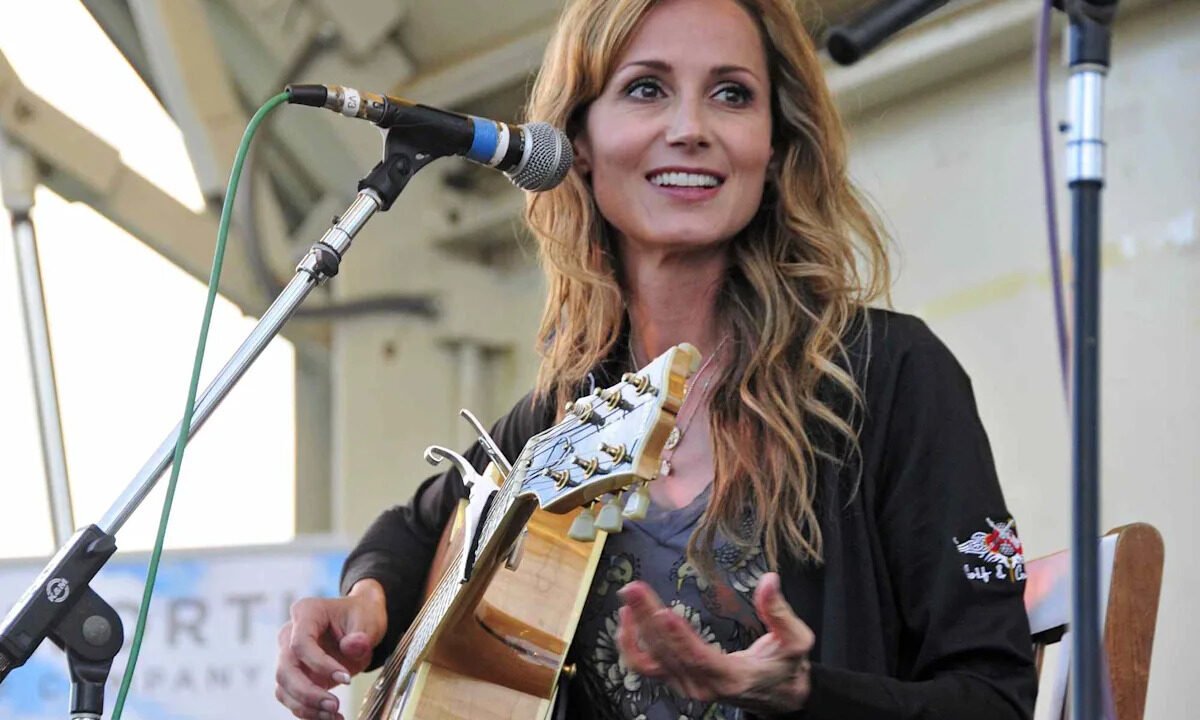
NEED TO KNOW
-
Chely Wright became the first openly gay country artist when she came out in 2010
-
She paved the way for more LGBTQ+ stars — including Ty Herndon, TJ Osborne and Maren Morris — to come out
-
“I think we’re all reckoning with how much progress was made in such a short amount of time, and how terribly fragile those freedoms and protections are,” she says of Pride in 2025
Chely Wright rocked country music when she came out 15 years ago.
In 2010, the singer-songwriter — who rose to fame with hits like “Single White Female” and “Shut Up and Drive” — became the first gay country artist to come out publicly. Now, during Pride Month, Wright, 54, is looking back on her legacy as a rule-breaker and trailblazer in Nashville and beyond.
“I love that I got to put down a pebble on a not well-traveled path in country music — but certainly a more traveled path than it was in 2010,” Wright tells PEOPLE.
Wright decided to come out after contemplating suicide in 2006.
“I did not have a choice. I knew that I was coming out just a few hours after I had not ended my life. If I want to survive myself on earth, I had to come out or I wasn’t going to make it,” she says of her choice. “So there was that fight or flight survival, that feral instinct to do whatever I needed to do to maintain life.”

Matt Winkelmeyer/Getty
Chely Wright performing in L.A. in June 2021
Wright also knew that she didn’t want to just come out, she wanted to “come out well,” which meant sharing her own harrowing story, as well as teaming up with professionals at organizations like GLAAD and GLSEN that could help her best represent the LGBTQ+ community.
“I knew I had to tell my story, which was why I wrote my book, and then I knew it was important for me to educate myself or get educated on what the gay rights movement had been, where it was, where it needed to go,” says Wright, who now works as the senior vice president of corporate social responsibility and new market growth at facilities management company ISS.
Wright spent four years preparing for her coming-out moment with her 2010 memoir, Like Me: Confessions of a Heartland Country Singer, which PEOPLE excerpted exclusively at the time. Along the way, Wright also had to unlearn the internalized homophobia she’d suffered for for years. And no major country star had ever come out, so she had to look to other queer icons in entertainment for advice and inspiration.
“Rosie O’Donnell was a mentor of mine and helped me. There were the Rosies in the world, the Ellen DeGenereses in the world, Melissa Etheridge, k.d. lang … [At one time], their coming out when they did scared me, made me mad — made me mad because it made me self-reflective; I looked myself in the mirror, and I knew I didn’t have the courage to do what they’d done.”
Adds Wright: “When I saw the courage of the Ellens and the Rosies and the k.d. langs, it was a complicated journey in how I looked at them. I understood their contributions, and there are no bigger heroes in the world than the Elton Johns and those who came before me. I do, of course, stand on their shoulders. But I wrapped myself into a pretzel trying to talk myself into reasons why I didn’t need to come out. And then I realized, ‘Oh, s—, I am a categorically successful, safe person with a relative security in my life.”
After that epiphany, Wright felt her coming out had purpose.
“I had a responsibility to raise my hand and say, ‘I am gay, and I’m proud of who I am,’ ” she recalls. “When I came out, I can’t tell you how many thousands of people said, ‘I didn’t think I knew a gay person.’ ”
Still, coming out ruffled some feathers in Nashville.
“When I came out, I went around the industry. Not to spite anyone, but because I knew it was such a revolutionary notion to own it, control my narrative, be strategic about how I came out, be thoughtful about not just coming out, but coming out well because I needed to take the story to the people, to the fans. There was no gatekeeper in Nashville that was going to say, ‘Let’s do this. Let’s tell this story.’ So I went around what I knew to be the infrastructure, and I broke some rules,” she says.

Courtesy of Chely Wright
Chely Wright’s headshot in 2025
Nashville, as a whole, “is not as unwelcoming a place as some think, and it’s not as welcoming a place as some would like to believe,” Wright says.
“The industry has been more accepting of, not openly gay artists, but the gay songwriters we’ve had and publicists. And there’ve always been these people, my people, but it’s always been, ‘Well, how could country music be homophobic when X had a hit song that they wrote? How could country music be homophobic when there are so many gay men doing hair?'” Wright says, calling out “willful ignorance.”
Today, Wright believes that the country music industry “is more welcoming as a whole than most might think, and not as advanced and evolved as many who might think. And if you drill down on the not as evolved as many might want to believe, pay attention to how adjacent they are to power. The closer to the power center you are, the less likely you will acknowledge that the systems and the norms and the structures within that entity, the less likely you are to admit there’s a problem, because if you do, and if you are adjacent to power, then you have to do something. And you also have to acknowledge that you’ve benefited from a system or institution that is unfair. Then it makes you self-reflective about your position. And it’s really hard for people to acknowledge privilege.”
Wright adds: “People in power at that time who had a hard time acknowledging the significance of my coming out. They needed to dismiss me, they needed to say, ‘She wasn’t big enough. She’s not as famous as she once was, so it doesn’t matter.’ Or, ‘We all knew she was gay,’ or ‘She’s just coming out for attention or the money.’ By the way, can you tell me where that pot of golden coming out in country music is? But they bent themselves out of shape because it was too hard for them to acknowledge, ‘I have a lot of power in a system that isn’t quite where we need to be, and if I acknowledge that there aren’t enough openly gay or queer people in country music, then I, because of my adjacency to power, then I have to do something about it.’ “
Therefore, Wright says, coming-out stories still matter.
“Representation matters. That’s why the firsts matter and the second and the thirds and the fourths,” says Wright, who shares two kids with her wife Lauren Blitzer. “I think the conversations are well underway, and so we need more people to raise their hands, only if they feel safe and able. There is an inertia built up behind a first. And once that first stage gate is tipped over, things can happen very quickly.”
Indeed, Wright cracked open the closet door for more LGBTQ+ stars to come out in Nashville, from Billy Gilman to Orville Peck.

D Dipasupil/Getty
Chely Wright with Kristin Chenoweth and Ty Herndon in N.Y.C. in 2014
Five years after Wright came out, her longtime friend and confidante Ty Herndon followed suit, coming out in an exclusive interview with PEOPLE — with Wright’s help.
“When I came out, he was one of the first people to reach out to me. He said, ‘I know I need to come out, too.’ And he said, ‘Is it worth it to come out?’ And I said, ‘Well, it’s worth it to hide until it’s not,’ ” she recalls of a 2010 phone call they had. “About three and a half years after I’d come out, he reached out to me and said, ‘Sister, I need to talk to you.’ And we got on the phone, and I think we talked for three or four hours, and he said, ‘I want to do it and I want to do it well, and I want your help.’ So Ty Herndon’s contribution, not just to music and to the community of country music, but to the queer community at large, is incalculable.”
Later, TJ Osborne — one-half of the Brothers Osborne country duo — made a rare move to reveal his sexuality at the height of his career, coming out as gay in a 2021 interview with Time.
“TJ and I, we’ve had conversations about this. The stakes were so incredibly high. So the fact that TJ Osborne raised his hand and owned it and owned his narrative. Everyone around TJ could have said, ‘Not now, man. Just a few more years. Not now. It’s too good right now. Just wait.’ That his brother said, ‘Yeah, man, let’s go,’ and his ecosystem, his people, his manager said, ‘Yes, now,’ because TJ said now … And they respected him so much and understood and had the emotional intelligence to see that this man can’t wait. [His impact is] incalculable as well,” Wright says.
She adds: “He took his power and he swung it around, if I may. He swung it around, and he’s unapologetic about the gay man that he is. But anyone who thinks that didn’t affect the Osborne Brothers career is not a serious person. He paid a price. There were knocks on the door that didn’t come, sponsorship-wise, tour-wise, I promise you; I guarantee you.”

ISS/Guckenheimer
Chely Wright (with chef Amanda Freitag) speaking at a Pride event for God’s Love We Deliver in N.Y.C. on June 24, 2025
More recently, Maren Morris revealed she is bisexual — not in an interview, but in a short Instagram post marking Pride Month in 2024.
“I love that Maren came out the way she came out. She’s a total baller,” Wright says. “The time that Ty spent in his coming out was shorter than mine. And the time that TJ spent in his preparation getting ready to come out the way he wanted to and needed to, that was shorter. And then Maren just posted on Instagram; there was thought put into it, but it was the timeline and the need to plan and prepare. [The time it takes to come out now] shortens.”
While progress is being made in country music and Nashville, the LGBTQ+ community continues to face political attacks and setbacks, which Wright — who hosted a Pride event for the God’s Love We Deliver charity in N.Y.C. on June 24 — has been pondering this Pride season.
“I think the fragility of our community and the rights that we’ve achieved is at center stage right now,” she says, “and I think we’re all reckoning with how much progress was made in such a short amount of time, and how terribly fragile those freedoms and protections are.”
If you or someone you know is struggling with mental health challenges, emotional distress, substance use problems, or just needs to talk, call or text 988, or chat at 988lifeline.org 24/7.
Read the original article on People






